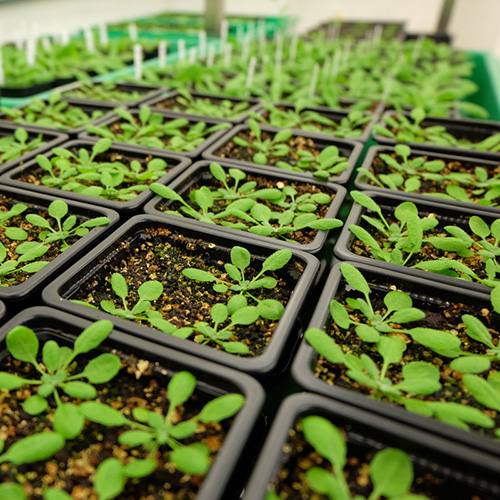
Plant Stress Signaling
Elena Baena Gonzalez
Management of energy resources is important for the survival of all organisms. Energy management occurs at the cellular level to support relevant processes but also at the whole organism level where an efficient coordination of activities in different organs is required for optimal use of resources and proper growth and development. In plants energy is available in the form of carbon fixed through photosynthesis and the management of this carbon is a major determinant of crop productivity, affecting the intrinsic yield potential, as well as traits such as flowering time, senescence, seed filling, and stress tolerance.
However, the underlying mechanisms are poorly understood.
The Plant Stress Signaling lab work aims to understand how plants manage their carbon resources and how carbon management systems interact with other signaling pathways to control stress responses and growth and to drive adequate developmental decisions. To this end, the research group is focusing on one major component of the carbon management network, the SnRK1 signaling pathway. SnRK1 is an evolutionarily conserved protein kinase complex (ortholog of human AMPK) that is activated in response to declining energy levels (e.g. during stress) to promote energy-producing catabolic processes and to inhibit energy-consuming biosynthetic processes and growth. Conversely, SnRK1 is repressed by sugars such as trehalose-6-phosphate.
Manipulation of SnRK1 results in altered tolerance to a wide range of abiotic and biotic stresses, as well as a broad spectrum of growth and developmental phenotypes.
They are undertaking a multifaceted strategy that combines biochemical approaches, transient cell-based assays, genetics, proteomics and metabolomics with various interactor and mutant screens to address:
- how is SnRK1 regulated?;
- how does SnRK1 control gene expression and central metabolism?;
- how does SnRK1 interact with the ABA pathway, also central to stress responses and development?;
- how does SnRK1 modify specific developmental processes?
In the long-term, their goal is to identify mechanisms by which plants adapt to unfavorable environments, ultimately contributing potential strategies to enhance stress tolerance and productivity.
Publications
- Bruno Peixoto, Thiago A Moraes, Virginie Mengin, Leonor Margalha, Rubén Vicente, Regina Feil, Melanie Höhne, António G G Sousa, Jingtao Lilue, Mark Stitt, John E Lunn, Elena Baena-González, (2021) Impact of the SnRK1 protein kinase on sucrose homeostasis and the transcriptome during the diel cycle.. Plant Physiology 187 (3):1357–1373
- Belda-Palazón B, Adamo M, Valerio C, Ferreira L, Confraria A, Reis-Barata D, Rodrigues A, Meyer C, Rodrigues PL and Baena-González E (2020) A dual function of SnRK2 kinases in the regulation of SnRK1 and plant growth.. Nature Plants
- Mancio-Silva, L., Slavic, K., Grilo Ruivo, M.T., Grosso, A.R., Modrzynska, K.K., Medina Vera, I., Sales-Dias, J., Gomes, A.R., MacPherson, C.R., Crozet, P., Adamo, M., Baena-González, E., Tewari, R., Llinás, M., Billker, O., Mota, M.M. (2017) Nutrient sensing modulates malaria parasite virulence.. Nature. 547:213-216
- Baena-Gonzalez, E., Hanson, J. (2017) Shaping plant development through the SnRK1-TOR metabolic regulators.. Curr Opin Plant Biol. 35:152-157
- Carvalho, R.F., Szakonyi, D., Simpson, C.G., Barbosa, I.C., Brown, J.W., Baena-Gonzalez, E., Duque, P. (2016) The Arabidopsis SR45 splicing factor, a negative regulator of sugar signaling, modulates SNF1-Related Protein Kinase 1 (SnRK1) stability.. Plant Cell 28:1910-1925
- Nukarinen, E., Nägele, T., Pedrotti, L., Wurzinger, B., Mair, A., Landgraf, R., Börnke, F., Hanson, J., Teige, M., Baena-Gonzalez, E., Dröge-Laser, W., Weckwerth, W. (2016) Quantitative phosphoproteomics reveals the role of the AMPK plant ortholog SnRK1 as a metabolic master regulator under energy deprivation.. Sci Rep 6:31697
- Crozet, P., Margalha, L., Butow, R., Fernandes, N., Elias, A., Orosa, B., Tomanov, K., Teige, M., Bachmair, A., Sadanandom, A., Baena-Gonzalez, E. (2015) SUMOylation represses SnRK1 signaling in Arabidopsis.. Plant J. 85:120-133
- Martinho, C., Confraria, A., Elias, A., Crozet, P., Rubio-Somoza, I., Weigel, D., Baena-Gonzalez, E. (2015) Dissection of miRNA pathways using Arabidopsis mesophyll protoplasts.. Mol Plant 6:261-275
- Mair, A., Pedrotti, L., Wurzinger, B., Anrather, D., Simeunovic, A., Weiste, C., Valerio, C., Dietrich, K., Kirchler, T., Nägele, T., Vicente Carbajosa, J., Hanson, J., Baena-Gonzalez, E., Chaban, C., Weckwerth, W., Dröge-Laser, W., Teige, M. (2015) SnRK1-triggered switch of bZIP63 dimerization mediates the low-energy response in plants.. eLife. 4:e05828
- Crozet, P., Margalha, L., Confraria, A., Rodrigues, A., Martinho, C., Adamo, M., Elias, A., Baena-Gonzalez, E. (2014) Mechanisms of regulation of SNF1/AMPK/SnRK1 protein kinases.. Front Plant Sci. 5:190
- Rubio-Somoza, I., Chuan-Miao, Z., Confraria, A., Martinho, C., von Born, P., Baena-Gonzalez, E., Wang, J.W., Weigel, D. (2014) Temporal control of leaf complexity by miRNA-regulated licensing of protein complexes.. Curr Biol. 24:2714-9
- Rodrigues, A., Adamo, M., Crozet, P., Margalha, L., Confraria, A., Martinho, C., Elias, A., Rabissi, A., Lumbreras, V., González-Guzmán, M., Antoni, R., Rodriguez, P.L., Baena-Gonzalez, E. (2013) ABI1 and PP2CA phosphatases are negative regulators of SnRK1 signaling in Arabidopsis.. Plant Cell 25:3871-3884

